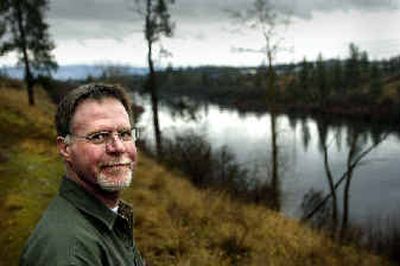Parks worker’s legacy will continue to grow

All through grade school, Wayne Hughes was an underachiever, the kid who moved at a mule’s pace when it came to anything but recess. Concerned teachers were more than willing to forecast his lot in life if he didn’t get busy.
“Actually, I had a teacher who was psychic, Mrs. Mix,” Hughes recently recalled. “She told me that if I didn’t do my reading, writing and arithmetic, they would put me in charge of picking up trash in parks somewhere.”
And that’s just what happened. Five years after high school, the Spokane Valley native hired on with the Spokane County Parks Department, where he stayed for 30 years, before a shakeup in park management edged him toward retirement.
Of the county’s 27 parks, nine located in the Spokane Valley now belong to the area’s newest city. Spokane Valley, which initially paid the county to maintain the parks, opted for a private contractor to take over park duties Jan. 1. Hughes, 53, and four other county employees were downsized in the shuffle.
The park duties, which went out for bid, were characterized as lawn mowing, walkway fixing, and true to the assessment of Mrs. Mix, picking up trash.
Hughes didn’t just pick up trash. He made sure there were hay bales to catch sledders hurtling down the slopes of Valley Mission Park. He disassembled the ramps and jumps that toboggan thrill seekers made.
He led schoolchildren on tours of Plantes Ferry Park and the site where Antoine Plante, the frontiersman for whom area was named, shuttled tenderfeet across the Spokane River. Maybe he gave tours to Valley schoolchildren because he remembered that growing up, there wasn’t much there to show. Hughes grew up in the shadow of a cement plant opposite the Plantes Ferry riverbank. The cement dust belched by the plant still coats river rocks in the area today.
Hughes built the nine-mile Liberty Creek Loop Trail. Of course he had help from many others, but Hughes had a hand in just about every county park created since the county began buying up acreage for play and conservation in 1974. When beavers began clashing with a portion of the Liberty Lake trail this year, Hughes spared the animals and moved the trail.
“He’s a man of great vision who can see the big picture,” said Joe Ridlington, who calls Hughes a friend. “He kind of jokes about not being very smart, which is not true at all.”
A Boy Scout scoutmaster, Ridlington said with Hughes’ help, scouts put in two outhouses, two miles of trail and a cabin with a dining room on the Liberty Lake Loop trail. There’s a scout-built campground named “Camp Hughes” on the trail to honor Wayne, who was active in a local scout committee.
“I think they’ll definitely notice him gone,” said Mac Mikkelsen, a ranger at Riverside State Park who got his start working for Hughes. “A lot of my philosophy on park management would be shared by him because that’s where I got it, grass roots stuff. The public comes first. Make the park presentable and be presentable yourself.”
So much had changed in Hughes’ 30 years, Mikkelsen said. The job evolved into conserving and preserving some of the wilder areas on the community’s edges. Hughes took on those duties in addition to mowing, fixing and watering. And he never forgot that someone had to take the garbage out.